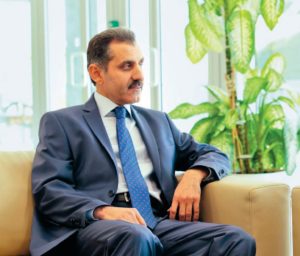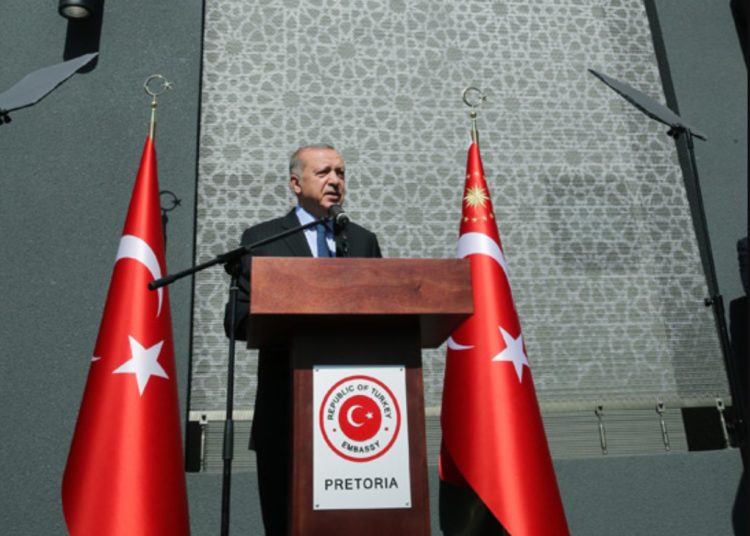Abdullah Bozkurt/Stockholm
The Turkish Embassy in Pretoria made preparations to seek the extradition of critics of the government of President Recep Tayyip Erdoğan and asked Turkish judicial authorities to follow a template apparently designed to convince South African authorities, part of a global witch-hunt of opponents.
According to government documents obtained by Nordic Monitor, the Turkish Embassy devised a sample form for extradition requests specifically designed for critics in South Africa, saying it would help persuade South African officials if the forms were filled out according to the template.
On May 24, 2018, the Turkish Foreign Ministry sent a translated version of the form, originally in English, to the Justice Ministry. The move represented an escalation of an ongoing campaign of profiling, spying, harassment and denial of consular services to critics by Turkish diplomats in South Africa.
Turkey has gained notoriety under the oppressive President Erdoğan when it comes to abusing the criminal justice system and manipulating criminal procedures to muzzle critical voices, stifle dissent and intimidate the opposition. Turkish authorities are quick to brand opponents of the current regime as terrorists, and partisan prosecutors have been known to fabricate evidence to build bogus cases against unsuspecting people who have nothing to do with terrorism or crime.
Extradition template created by the Turkish Embassy in South Africa to harass and intimidate critics and opponents:
A document signed by Justice Ministry official Abdullah Ömeroğlu on March 29, 2021 mentioned the form sent by the Foreign Ministry and drew attention to problems with Interpol notices issued by Turkey against critics. He said the actions taken by executive bodies such as criminal complaints filed by the government must be kept hidden from Interpol in order to secure the acceptance of requests from Turkey.
Interpol has rejected multiple filings from Turkey in recent years on the grounds that they were politically motivated and violated Interpol’s constitution. The Interpol General Secretariat formally informed the Turkish government in a letter on May 4, 2018 that the summary filings by Turkish authorities against 115 people who were believed to have been affiliated with the Gülen movement, a group critical of the government, were not acceptable. It also warned against new filings against these people, citing violations of the Interpol constitution.
As one of the most prolific transnational repressors, the Turkish government has not only abused Interpol’s Notices system but also its messaging and diffusions, especially Lost and Stolen Passports, in order to maintain pressure on government critics abroad and muzzle critical journalists who still write or speak about Turkish affairs from exile.
The template created for South Africa targeted Turks affiliated with the Gülen movement. The Justice Ministry document mentioned Selman Kuzu, whom the Turkish authorities believed was living in South Africa.
Kuzu, a 55-year-old theologian and TV commentator, was coordinator of a nongovernmental association called Peygamber Yolu Derneği (Prophet’s Path Association), an advocacy group aimed to disseminating broader knowledge of the Prophet Muhammad and other prophets of Abrahamic religions in Turkey. The Turkish government unlawfully shut down the association in 2016 along with hundreds of others on the grounds that they were critical of the Erdoğan government and associated with the Gülen group. The government used counterterrorism laws, the most abused articles of the penal code, in cracking down on the opposition.

The association aimed to fight against radicalism by correcting misconceptions about the Prophet Muhammad’s life and focusing on traits of his true character such as tolerance, peace and winning people’s hearts and minds through dialogue.
At an inauguration event in January 2014 association president Ali Demirel rejected the characterization of the Prophet Muhammad as a prophet of war and said that in his 23 years as a prophet, which amounts to around 8,000 days, it was seen that the total time Muhammad spent fighting was only one day. He said most of the battles Muhammad fought lasted only a couple of hours and that he did not kill anyone.
In a speech Kuzu said believing in the 25 prophets including Jesus and Moses mentioned in the Quran is one of the essentials of the Islamic faith. He talked about the pacifist nature of the Prophet Muhammed and the moral values he brought to public attention.
Just like thousands of others, Kuzu had to leave Turkey to escape prosecution and prison on fabricated charges brought by the Erdoğan government. He has been living in exile since 2016, and Turkey’s efforts to bring him back have so far failed.
Turkish Justice Ministry document that reveals strategies for the extradition from South Africa of a critic named Selman Kuzu:
Nordic Monitor previously published secret Turkish government documents that revealed how the Turkish Embassy in Pretoria spied on critics, opponents and dissident from Turkey, revealing scandalous activity conducted by Turkish diplomats in South African territory. The spying by diplomats, a breach of the Vienna Conventions, was confirmed in 92 foreign countries as part of profiling and espionage activities that at times amounted to a systematic and deliberate campaign of refugee spying.
Foreign Minister Mevlüt Çavuşoğlu admitted to systematic spying on Turkish government critics on foreign soil by Turkish diplomatic missions in February 2020. He said Turkish diplomats assigned to embassies and consulates have officially been instructed by the government to conduct such activities abroad.
President Erdoğan branded the Gülen movement as a terrorist organization in the aftermath of December 2013 corruption investigations that incriminated him, his family members and his business and political associates in an Iran sanction-busting scheme. He accused the movement leader, Fethullah Gülen, of initiating the graft probes, an accusation that Gülen denied. The cleric, fiercely opposed to Iran’s mullah regime and highly critical of Erdoğan for aiding and abetting radical jihadist groups, has been living in self-exile in the US since 1999.

Path Association.
The government launched a major crackdown on the group, jailing and/or purging tens of thousands of government employees, unlawfully seizing their assets and shutting down schools, universities, NGOs, media outlets, hospitals and other entities that were owned or operated by people associated with the movement.
In 2016 Erdoğan added coup charges against Gülen, who denied any involvement in an abortive putsch that was branded by many as a false flag operation organized by President Erdoğan and his intelligence and military chiefs. Erdoğan used the event as a pretext to acquire “imperial” presidential powers, launched cross-border offensives into Syria and deployed troops to Libya and Azerbaijan.
According to official data announced in February 2021, a total of 622,646 people have faced punitive legal action in the last five years by the government due to alleged links to the Gülen movement. Of these, 301,932 have been detained and 25,467 jailed pending trial or due to conviction. Nearly 100,000 people were released after imprisonment under judicial supervision, meaning they are subject to a travel ban and are required to check in with a local police station on a regular basis.












